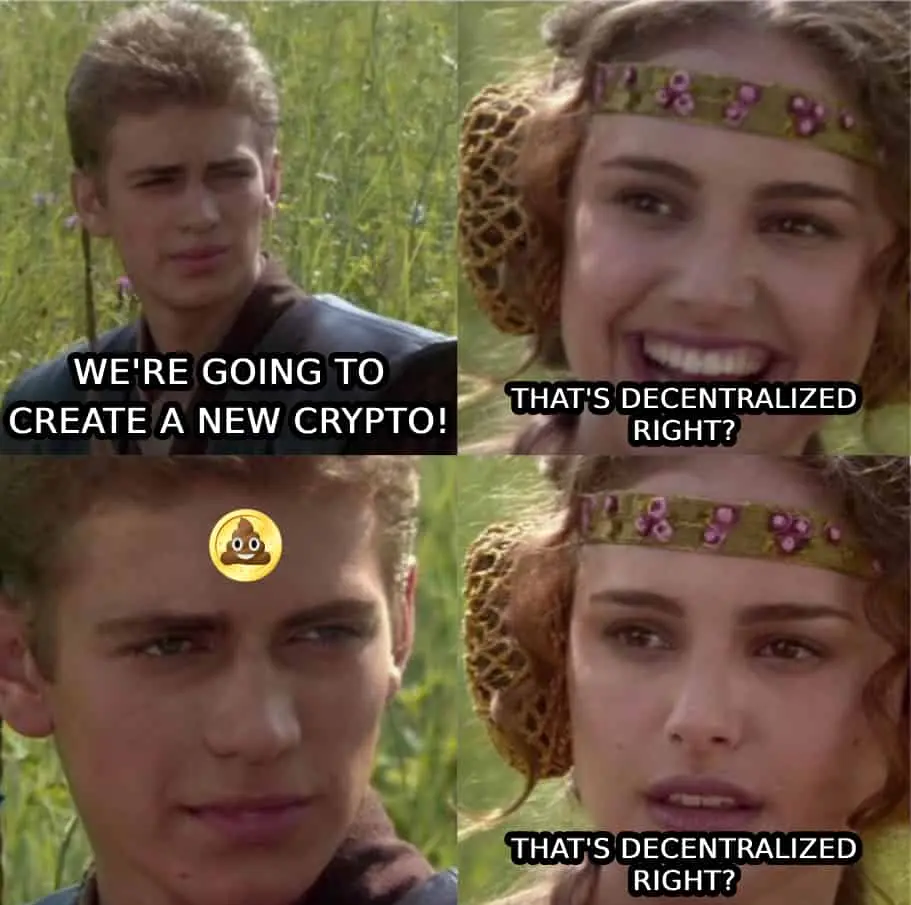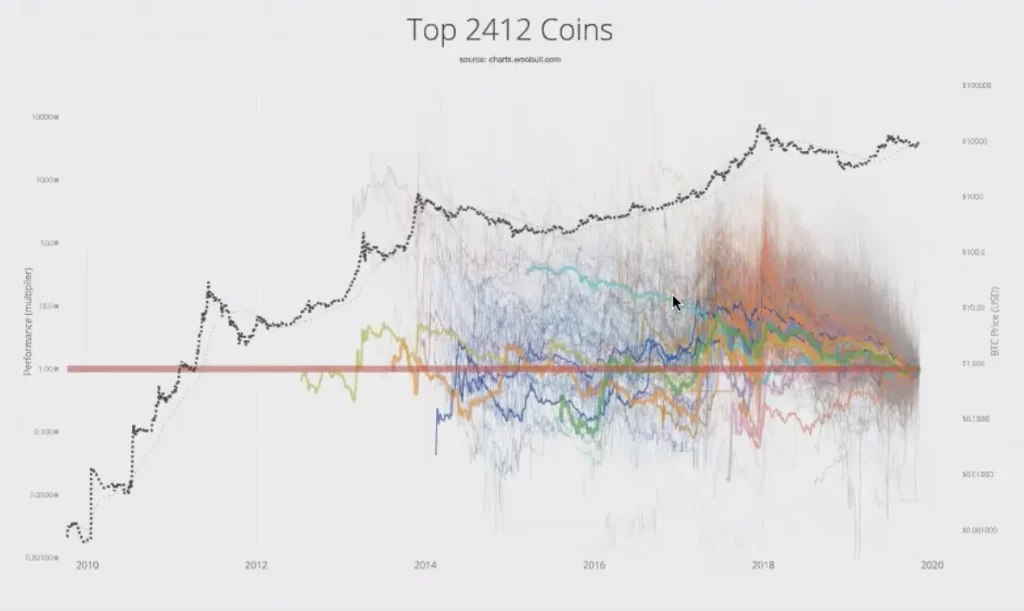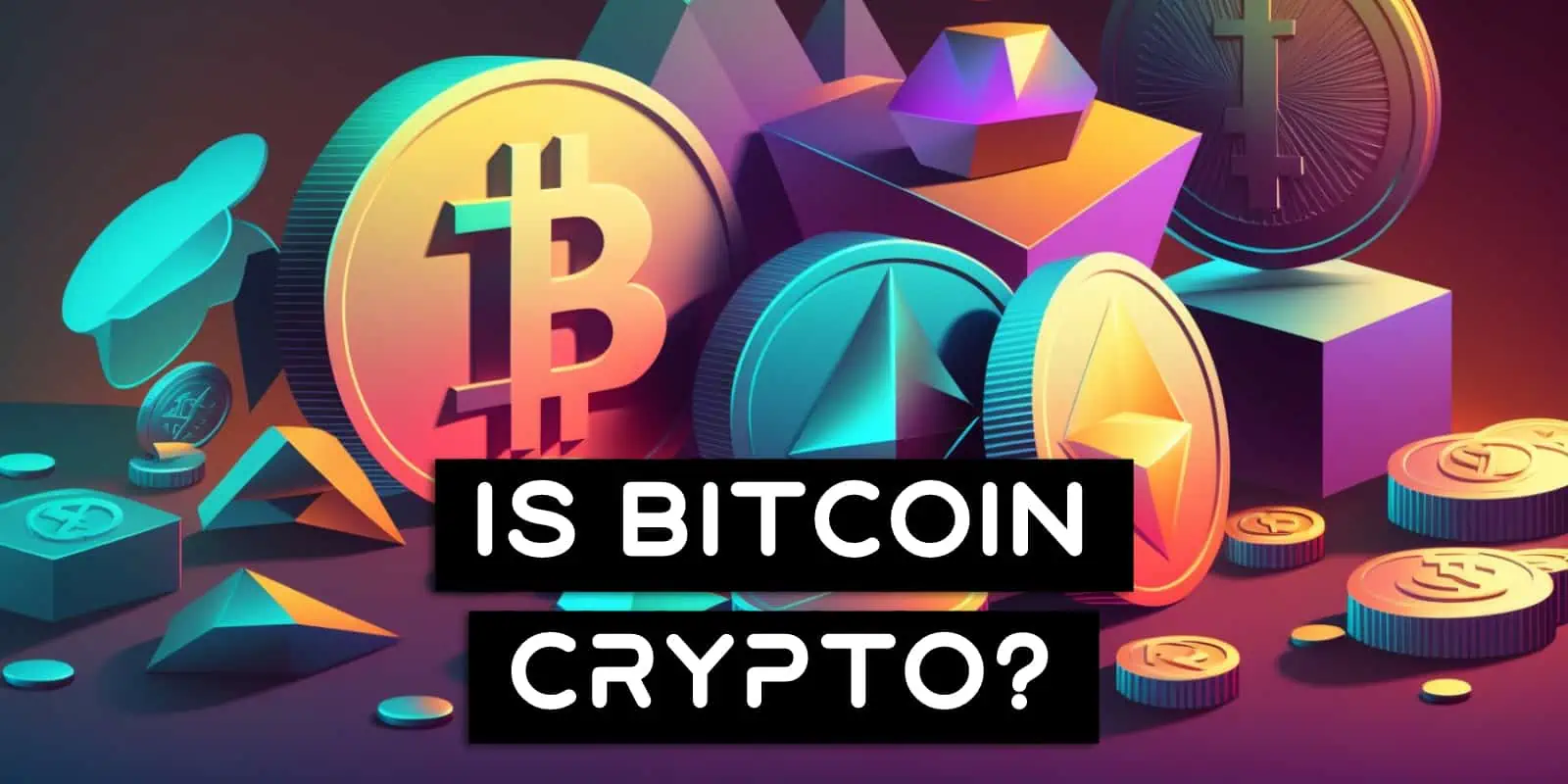We know there’s a ton of confusing info to absorb when learning about what Bitcoin is. But that’s why we’re here, to supply top tier, clear content that helps you learn. One question that comes up frequently is: is Bitcoin cryptocurrency?
It’s a fundamental thing being able to define the differences between the two, so let’s dig deep into it and explain (simply) why Bitcoin is a cryptocurrency… but also why there’s still a huge void between the two.
Contents
Is Bitcoin Cryptocurrency?
Yes! Bitcoin was the first cryptocurrency and started a Cambrian explosion resulting in thousands of them being created after it debuted in 2009. That being said, there are substantial differences between what Bitcoin is, how it’s governed, its network and what it’s used for when compared to all other cryptocurrencies out there.
After Bitcoin was created, other quickly started to try and copy it, creating dozens, then hundreds, then thousands and now tens of thousands of other cryptocurrencies that are now all referred to as altcoins.
Do not touch them!
A big error many new comers make is to assume that Bitcoin is “competing” with all these other cryptocurrencies when in actual fact, most of them don’t even attempt to do the same thing Bitcoin does.
It would be like saying that a gold bar is competing with Apple. Dumb thinking. It’s also very rare that other educators point this out too. It’s almost like they have some sort of vested interest in shilling you their next altcoin or grifting trading fees off you.
While there are a handful of cryptocurrencies that claim to be “actual competitors”, Bitcoin is by orders of magnitude the undisputed king and the only serious contender for digital scarcity. All of these other challengers have long since crashed to a mere fraction of what Bitcoin is which is why the second rule of altcoins is you do not touch them!
>> Deeper Dive: Bitcoin, Not Crypto
When it comes to networks (computer networks, social networks and now monetary networks), the first mover advantage is key and it’s absolutely a “winner takes all” area. Bitcoin has the biggest network, the best security and the best liquidity and trying to overcome that Network Effect now, a decade plus in, is basically impossible at this point. As such, Bitcoin won’t ever be replaced by another coin.
The rest of the cryptocurrencies out there are blazing their own trails in completely different fields like gaming, identity, DNS and more. While we don’t recommend touching them (we’re laser eye focused on Bitcoin here), it’s also important to know that most of them aren’t even trying to compete with Bitcoin, they’re completely different things.
>> Read More: What’s The Difference Between Bitcoin And Cryptocurrency?
What Is A Cryptocurrency?
Cryptocurrencies all have the following core attributes in common:
- They are digital only, with no physical real world presence (like a $5 note)
- They are secured using cryptography to prevent counterfeit or double-spending
- They are not issues by a central authority such as a central bank
- They use distributed ledger technology, typically called a blockchain
From those core attributes, the almost 50,000 different cryptocurrencies start to diverge in terms of what they do, how they do it and what their purpose is. For example many use mining to process transactions and distribute their token, but some will use Proof-of-Work (PoW) where as others will use Proof-of-Stake (PoS). Others use mining methods that are different still.
Not all cryptocurrencies are built to be forms of money, some are used for other purposes such as tokens, art or wrapped versions of other existing cryptocurrencies like WBTC. There is also a huge difference in the size of various cryptocurrency markets, some being virtually worthless while others command hundreds of billions of dollars.
Some are built for huge transaction throughput, while others are built for social media or identity verification purposes. Some are heavily decentralized or private, while others are completely centralized and not private at all.
Another major part of all cryptocurrencies (or “cryptos”) is how they are governed. That is, who decides how many tokens there will be, how those tokens will be distributed and to whom? How will the software code be changed in the future? Will some features be rolled out or ignored?
All of these factors allow all sorts of different possibilities and use cases from the original Bitcoin to the entire slew of meme coins to emerge. Many equate it to back in the 1990’s/2000’s when all manor of new and amazing internet companies were exploding onto the scene. Will all still be around 20 years from now? No. But some Google’s and Facebook’s are likely among us already.
New to Athena Alpha? Start today!
What Is The Blockchain?
We mentioned it before, but there’s a big difference between Bitcoin and Blockchain. One very common trap new comers often fall into is thinking they’re the same thing, but Bitcoin is not blockchain.
In order to keep track of who owns what tokens or coins, cryptocurrencies use blockchain technology. This is referred to as a ledger and is essentially just a big database / file that is constantly updated to show who owns what. For example it might say “Bill owns 1 bitcoin”.
>> Dive Deeper: What Is Blockchain?
When a transaction is broadcast and ownership of various coins change hands, it’s bundled together into a “block”. This block is then added or “chained” onto all the existing ones. All these individual blocks, chained together form the blockchain.
Different cryptocurrencies have different rules surrounding how they mine and manage their blockchains. Some have large block sizes that get mined very quickly, this is a key Difference Between Bitcoin and Bitcoin SV for example.
How Is A Cryptocurrency Created?
The most common way cryptocurrencies are created is through the mining process. We’ve already covered in detail how Bitcoin Mining works but many cryptocurrencies don’t use the same PoW method that Bitcoin does.
Many perform what’s called “pre-mines”, which is where a number of the tokens or coins are mined in advance and given to the original developers or investors as a reward for their work and to incentivize them to grow the network.
While this isn’t strictly unfair, a significantly skewed token distribution combined with certain consensus methods like PoS can have the serious consequence of making the entire project “decentralized” in name only.

Other networks reward certain activities with the tokens themselves such as creating a social profile or playing a game and winning in order to distribute them fairly and to those who use the platforms the most.
Some projects have an unlimited quantity of their coin or tokens while others like Bitcoin have a fixed supply monetary policy. It’s also common for some cryptocurrencies to be created or burned (destroyed) during certain events such as depositing or removing other tokens / coins.
What Are Cryptocurrencies Used For?
As stated, there are a huge number of different use cases that cryptocurrencies besides Bitcoin are used for. Ethereum is the largest decentralized applications platform that runs a world of dApps (decentralized Apps).
They’re used for holding assets, transacting and communicating without being controlled by a central authority and more. Running dApps isn’t the only Difference Between Bitcoin And Etherem either, they also have different consensus mechanisms too.
Stable coins such as Tether or USD Coin are types of cryptocurrencies that are pegged to another fiat currency like the US Dollar. They’re used for trading and transacting around the globe. Monero is a crypto specifically built and focused on privacy so that you can transact privately while Filecoin is a token used by the decentralized storage network by the same name. This allows users around the world to rent out their spare hard drives to enable a global, decentralized cloud storage service like Google Drive.
The breadth and depth of different projects popping up literally everyday is astonishing and virtually impossible to keep track of, let alone do proper due diligence on. If you thought computers moved fast, wait till you see the crypto universe in action!
What Are The Largest Cryptocurrencies?
As of writing, the top 5 cryptocurrencies are:
- Bitcoin
- Ethereum
- Tether
- BNB
- Solana
For an always update to date tally we recommend CoinGecko.com.
Are Cryptocurrencies Safe Investments?

Investing in shares is typically viewed as “risky” or volatile. Compared to cryptocurrencies though, investing in shares is a walk in the park! Cryptocurrencies and other Initial Coin Offerings (ICOs) are highly risky and extremely speculative. We do not recommend dealing with any other cryptocurrencies besides Bitcoin. There’s a reason other cryptocurrencies are referred to as “shitcoins”.
Even when it comes to Bitcoin, we do not make any specific recommendations. We aren’t certified financial planners or investment advisers in your country and we don’t know anything about you personally and so cannot advise on whether you should invest in them. Safe for one person is not safe for another.
Please make sure you never invest anything you’re not 100% comfortable with loosing and always consult a qualified professional before you begin so that they have all your specific details and can help you make an informed and smart decision.
Even Bitcoin, virtually the most stable of all cryptocurrencies, has regular huge swings both up and down. Crashing 10% in a day isn’t uncommon and pretty much standard fair. You’ve been warned!
FAQ
Are NFTs Cryptocurrencies?
No. Non-Fungible Tokens or NFTs are digital assets that assign ownership of an original digital file to someone. For example the digital file might be a picture, song or even short video and the NFT allows anyone to easily validate who the owner of the original file is. Any copies that are made do not posses the same linkage and so are obviously fraudulent.
Can You Convert Crypto To Cash?
Yes. While you will usually have to sign up to various online exchanges that insist you hand over a large amount of your private information like drivers license, name, address, photo etc, most major exchanges allow you to exchange cryptocurrencies for any type of fiat cash. We recommend non-KYC exchanges only.
What Is Proof-of-Work (PoW)?
PoW is a feature – not a bug – of Bitcoin and is what secures the network, distributes new coins and processes transactions. If you want to know more, we have a full piece reviewed by the inventor of PoW: Bitcoin Proof Of Work: Everything You Should Know
What Is Proof-of-Stake (PoS)?
While PoW uses real life work to prove that you are a “good actor” and have the authority to add transactions to the blockchain, PoS uses “staking” to provide the proof and achieve consensus about the accuracy of the transaction record on the blockchain. Staking simply means putting up a certain amount of the users cryptocurrency tokens as collateral that gets destroyed if it’s detected that you’re attacking or undermining the network during your mining activities.
Complete List Of Cryptocurrencies
For an always update to date list of all cryptocurrencies we recommend CoinGecko.com.
How Do You Pull Your Money Out Of Crypto?
There are many different types of exchanges for fiat and cryptocurrencies, just like there are many types of foreign currency exchanges for changing USD to EUR or other fiat currencies. These exchanges range from permissioned, centralized exchanges that you need to provide a host of private information to. To completely decentralized exchanges that run as pure software on your computer like Bisq.



